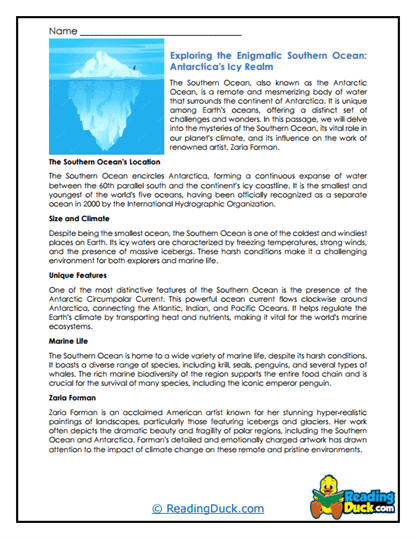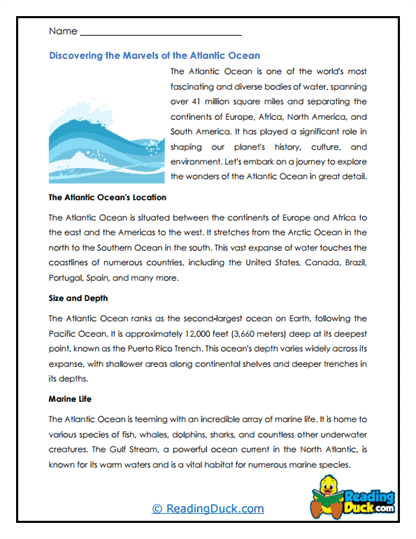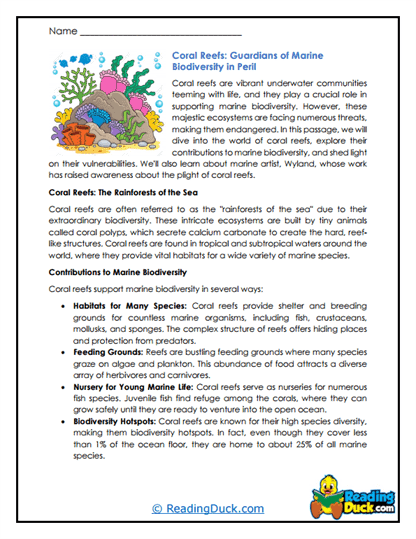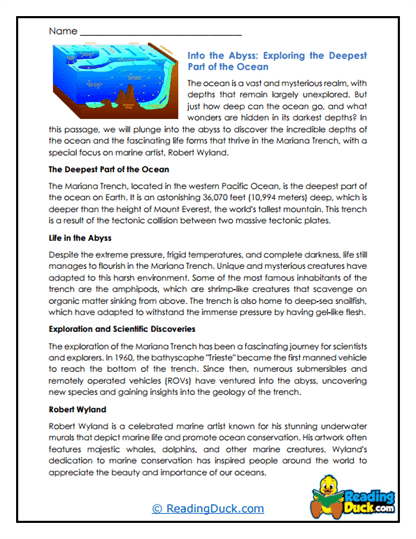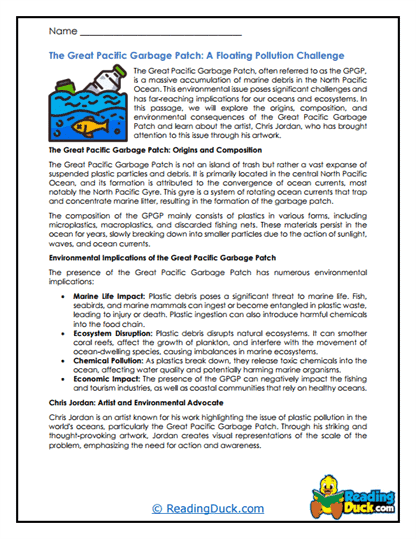Oceans Worksheets
About Our Oceans Worksheets
Our Oceans worksheets are designed to provide students with a comprehensive understanding of the world’s oceans and their critical role in our planet's ecosystem. These worksheets cover a wide range of topics, from the physical characteristics of different oceans to the significant environmental challenges they face today. This collection aims to engage students with visually appealing content and thought-provoking questions that deepen their understanding of the oceans.
Each topic in this collection contains several worksheet sets that encourage active learning:
- Multiple Choice Questions: These questions assess students’ comprehension of the reading passages, helping them to grasp key concepts about the oceans and their functions.
- Short Answer Questions: These prompts challenge students to express their understanding in their own words, fostering deeper engagement with the material.
- Open-Ended Questions: These questions invite students to share their personal thoughts, opinions, and preferences, encouraging critical thinking and personal connections to the topic.
All worksheets come with an answer key and are available in PDF format, making them easy to view, download, and print for both classroom and home use.
Exploring the Depths: Understanding the World's Oceans
The world’s oceans are vast, covering over 70% of the Earth’s surface. They are not only a source of immense beauty and biodiversity but also play a crucial role in regulating the Earth’s climate, supporting marine life, and sustaining human livelihoods. When introducing the topic of oceans to students, it's important to emphasize their complexity and the interconnectedness of their ecosystems. Each ocean has its unique characteristics, challenges, and contributions to the global environment.
Key Aspects of Oceans:
- Formation and Characteristics of Tsunamis: Students will explore how tsunamis form, the physical characteristics of these powerful waves, and their devastating impact on coastal communities. Understanding tsunamis also leads to discussions about the importance of early warning systems and disaster preparedness.
- The Southern Ocean: This ocean encircles Antarctica and plays a key role in global climate regulation. Students will learn about its unique properties, including its cold temperatures and the powerful circumpolar current that influences ocean circulation worldwide.
- The Arctic Ocean: The Arctic Ocean is the smallest and shallowest of the world’s oceans, yet it is crucial for regulating global temperatures. Students will explore the challenges this ocean faces due to climate change, such as melting ice and its impact on polar ecosystems.
- Pacific Ocean: As the largest and deepest ocean, the Pacific is home to a diverse range of marine life and significant geological features like the Mariana Trench. Students will examine the ecological importance of the Pacific and its role in global weather patterns.
- How Oceans Regulate Earth's Climate: Oceans absorb and store heat, playing a critical role in regulating the Earth’s climate. This topic helps students understand how ocean currents distribute heat around the globe and the impact of changing ocean temperatures on weather patterns.
- Human Impact on Ocean Pollution and Marine Life: Oceans are increasingly threatened by human activities, including pollution, overfishing, and habitat destruction. Students will investigate the sources of ocean pollution, such as plastic waste, and its devastating effects on marine ecosystems.
- The Indian Ocean: Known for its warm waters and rich biodiversity, the Indian Ocean is vital for the economies of the surrounding countries. Students will explore the unique challenges this ocean faces, including the impact of monsoons and rising sea levels.
- The Role of Oceans in the Global Carbon Cycle: Oceans act as a carbon sink, absorbing carbon dioxide from the atmosphere and helping to mitigate the effects of climate change. Students will learn about the processes involved in the global carbon cycle and the role oceans play in maintaining the Earth’s carbon balance.
- The Great Pacific Garbage Patch: This large accumulation of plastic debris in the Pacific Ocean serves as a stark reminder of the environmental consequences of human activity. Students will study the origins of this "garbage patch," its impact on marine life, and possible solutions to this growing problem.
- The Deepest Part of the Ocean: The Mariana Trench, located in the Pacific Ocean, is the deepest part of the world’s oceans. Students will explore the extreme conditions of this underwater canyon, the unique species that inhabit it, and the technological advancements that have made its exploration possible.
- Coral Reefs and Marine Biodiversity: Coral reefs are among the most diverse ecosystems on the planet, providing habitat for countless marine species. Students will learn about the structure and function of coral reefs, the threats they face, such as coral bleaching, and the importance of their conservation.
- The Atlantic Ocean: The Atlantic Ocean plays a significant role in global trade, weather systems, and marine biodiversity. Students will examine its historical importance, from the age of exploration to its current role in global shipping routes.
These topics provide students with a well-rounded understanding of the oceans, emphasizing their importance in maintaining the health of our planet. By exploring these aspects, students gain insights into the complex systems that govern the oceans and the critical need for their conservation.
The Oceans Matter: Why Students Should Learn About Them
Learning about the world’s oceans is crucial for students of all ages. Oceans are integral to the Earth's climate system, support a vast array of life forms, and provide resources and livelihoods for millions of people. By studying the oceans, students gain a deeper appreciation of these natural resources and the need to protect them for future generations. Understanding the oceans also enhances students’ awareness of global environmental issues, fostering a sense of responsibility and stewardship.
In addition to environmental significance, oceans are also a source of inspiration and wonder. The study of oceans encourages curiosity about the natural world, promoting scientific inquiry and exploration. Students who learn about oceans are better equipped to understand the interconnectedness of ecosystems and the impact of human activities on the environment. This knowledge not only benefits them academically but also shapes their attitudes towards environmental conservation and sustainability.
Incorporating Ocean Studies Across the Curriculum
To effectively integrate the study of oceans into the curriculum, educators and parents can utilize the following strategies. These tips ensure that students not only learn about oceans but also see their relevance in various aspects of their education:
- Cross-Curricular Integration: Connect ocean studies with other subjects, such as Geography, Science, and Literature. For example, students can study the geographical distribution of oceans, the science behind ocean currents, or read literature set in maritime environments.
- Field Trips and Virtual Tours: If possible, organize field trips to aquariums, coastal areas, or marine research centers. Alternatively, virtual tours of these locations can provide students with an immersive learning experience that brings ocean studies to life.
- Classroom Projects and Presentations: Encourage students to research and present on specific ocean-related topics, such as marine biodiversity, ocean pollution, or the role of oceans in climate change. These projects promote independent learning and allow students to explore topics that interest them.
- Hands-On Activities: Engage students with hands-on activities, such as creating models of ocean currents, simulating tsunamis, or building a coral reef ecosystem. These activities help students understand complex concepts and foster a deeper connection to the material.
- Incorporate Technology: Utilize technology to enhance learning, such as using apps and online tools to track ocean currents, monitor marine life, or explore underwater ecosystems. Technology can provide students with a dynamic and interactive learning experience.
- Environmental Stewardship Projects: Involve students in environmental stewardship projects, such as beach cleanups or campaigns to reduce plastic use. These activities encourage students to take action and apply their knowledge of ocean conservation in real-world settings.
- Guest Speakers: Invite marine biologists, oceanographers, or environmental activists to speak to students about their work and the importance of ocean conservation. Hearing from experts in the field can inspire students and provide them with a broader perspective on the topic.
- Incorporate Art and Creativity: Encourage students to express their understanding of oceans through art, such as painting marine landscapes, creating ocean-themed collages, or writing poetry about the sea. This approach allows students to connect with the topic on a personal and creative level.
- Group Discussions and Debates: Organize group discussions or debates on ocean-related issues, such as the impact of plastic pollution or the ethics of deep-sea mining. These activities promote critical thinking and help students develop their communication skills.
- Encourage Critical Thinking: Ask students to critically analyze current events related to the oceans, such as oil spills or coral reef destruction. Encourage them to think about the causes, consequences, and potential solutions to these issues.
By implementing these strategies, educators and parents can create an engaging and comprehensive learning experience that deepens students' understanding of the oceans. These activities not only enhance students' knowledge but also inspire them to think critically about their role in protecting the environment. Through the study of oceans, students will gain valuable insights into the importance of conservation and the impact of human activities on the natural world, preparing them to become informed and responsible global citizens.
